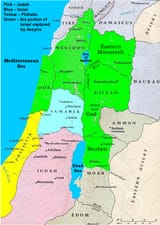Search Results
7/3/2025, 6:36:34 AM
>>17810584
>And is there any shred of proof for this,
Sure. After Solomon, there are only two kings from the line of kings of Judah who are also separately titled "king of Israel" in the Bible. This is because those two kings, and only those two kings, contested the throne of the northern kingdom as well.
One was the (later) king Ahaz, who is called "king of Israel" in 2 Chronicles 28:19. He seems to have this title during an interregnum in the northern or Samarian dynasty. Ahaz claimed the title of "king of Israel" sometime after the death of Pekah in c. 738 BC and before Hoshea appeared in c. 729 BC. It should be noted that the Assyrians had greatly weakened the northern kingdom during Pekah's reign (see 2 Kings 15:29) by taking about 3/4 of its land. See map.
Apart from Ahaz, the only other king of Judah who is also called "king of Israel" is Jehoshaphat. See 2 Chronicles 21:2. Jehoshaphat was the actual father of Ahaziah, according to 2 Chronicles 22:9. This makes Ahaziah the half-brother of Jehoram, as mentioned before.
We read that Jehoshaphat specifically claimed the title, "king of Israel" (see 2 Chron. 21:2). It would seem that Jehoshaphat schemed to make an alliance with Ahab with this in mind, as we see in 1 Kings 22 (the alliance later soured, see 1 Kings 22:49).
Jehoshaphat apparently intended for one of his sons rule the northern kingdom by fathering a child with Athaliah (Ahab's daughter). That way, one of his sons (Ahaziah) would have a valid claim to the northern kingdom, becoming a rival claimant against the other northern king. This explains Ahaziah's earlier reign. Jehoshaphat's other son (Jehoram) would eventually take over the southern kingdom of Judah. At least, that was what his plan was, but it didn't work out that way.
Ahaziah later ended up reigning in the southern kingdom twenty years later, but that reign only lasted one year. This is why the Bible is very careful to specify that he only reigned in Jerusalem for one year.
>And is there any shred of proof for this,
Sure. After Solomon, there are only two kings from the line of kings of Judah who are also separately titled "king of Israel" in the Bible. This is because those two kings, and only those two kings, contested the throne of the northern kingdom as well.
One was the (later) king Ahaz, who is called "king of Israel" in 2 Chronicles 28:19. He seems to have this title during an interregnum in the northern or Samarian dynasty. Ahaz claimed the title of "king of Israel" sometime after the death of Pekah in c. 738 BC and before Hoshea appeared in c. 729 BC. It should be noted that the Assyrians had greatly weakened the northern kingdom during Pekah's reign (see 2 Kings 15:29) by taking about 3/4 of its land. See map.
Apart from Ahaz, the only other king of Judah who is also called "king of Israel" is Jehoshaphat. See 2 Chronicles 21:2. Jehoshaphat was the actual father of Ahaziah, according to 2 Chronicles 22:9. This makes Ahaziah the half-brother of Jehoram, as mentioned before.
We read that Jehoshaphat specifically claimed the title, "king of Israel" (see 2 Chron. 21:2). It would seem that Jehoshaphat schemed to make an alliance with Ahab with this in mind, as we see in 1 Kings 22 (the alliance later soured, see 1 Kings 22:49).
Jehoshaphat apparently intended for one of his sons rule the northern kingdom by fathering a child with Athaliah (Ahab's daughter). That way, one of his sons (Ahaziah) would have a valid claim to the northern kingdom, becoming a rival claimant against the other northern king. This explains Ahaziah's earlier reign. Jehoshaphat's other son (Jehoram) would eventually take over the southern kingdom of Judah. At least, that was what his plan was, but it didn't work out that way.
Ahaziah later ended up reigning in the southern kingdom twenty years later, but that reign only lasted one year. This is why the Bible is very careful to specify that he only reigned in Jerusalem for one year.
Page 1
